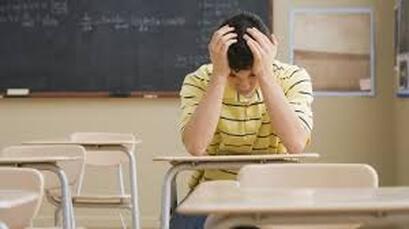|
Anxiety is one of the most common mental health concerns seen in a psychologists practice and is a common worldwide disability that cuts across national, racial and economic boundaries. Being young is no buffer against anxiety and is common in pre-adolescent and adolescent children. We routinely use the words fear and anxiety interchangeably but both are different. The distinction needs to be understood so appropriate help can be sought out......... Fear is an apprehensive and reasonable reaction to a perceived "unsafe" situation that is typical of that child's age and intellect. For example, fear of the dark or ghosts in an 8 year-old children. Fear does not generally debilitate or interfere in life but if the fear exacerbates to anxiety then it may become a concern.
Anxiety is an apprehensive overreaction to the possible consequence of some situations rather than the actual situation itself. For example, a child may be anxious to take a test as he may be worried about what will happen to him if he fails. It may be that, in reality, the worst thing to occur would be a scolding from parents or the disappointment of a teacher. To the anxious child, the dreaded imagined consequences, and the anticipation of the impending feelings, can make the situation intolerable and trigger anxiety. The intensity, duration and frequency help to define anxiety and differentiate from fear. Common symptoms of anxiety in children
These tips may help:
A trained therapist will be able to help the child identify the nervous thoughts so that they can be changed to COOL thoughts. This can help transform the feeling of anxiety to a state of "concern". Concern can be considered an adaptive state and lead to optimal performance. For example, being in a state of "concern" prior to an exam can help the student focus, attend to appropriate stimuli, access memories, retrieve information and perform as required. It is also reassuring to know that anxiety is not all bad. It is a safeguarding physiological mechanism that when triggered in a crisis situation can help to preserve life and protect us from danger. Understanding this and learning to differentiate between crisis and a normal situation can be helpful for the child. If you or a loved one need help to manage and reduce anxiety, we would love to help so give us a call on 0477 516 777
0 Comments
Your comment will be posted after it is approved.
Leave a Reply. |
Categories
All
|

